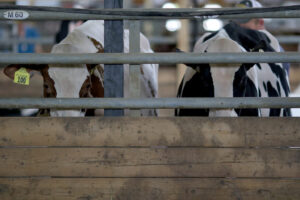Bird flu spreads cow-to-cow and to one human in Texas

So far no cows in Iowa have been reported to be infected with avian flu. (Photo by Jared Strong/Iowa Capital Dispatch)
by Jared Strong, Iowa Capital Dispatch
April 1, 2024
Texas cows are believed to have directly transmitted an avian flu to other cows and one person, according to state agriculture and health officials.
The new evidence of mammal-to-mammal transmissions of a virus that is highly infectious and deadly for domestic birds is a troubling development in the yearslong outbreak. Research published last month by the U.S. Centers for Disease Control and Prevention warned that the occurrences need to be closely monitored to prevent a potential health crisis.
The “virus may be changing and adapting to infect mammals,” researchers concluded. “Continuous surveillance is essential to mitigate the risk for a global pandemic.”
The Texas Department of State Health Services announced the human infection on Monday. The person worked closely with dairy cows that are thought to be infected, and he was likely infected directly by them.
“We believe that’s how it happened,” said Lara Anton, a spokesperson for the department.
The person’s only symptom is conjunctivitis — commonly known as “pink eye” — and he has been told to avoid contact with other people while he recovers, Anton said.
“We think that the risk is low for public health in general, for people who are not working with sick cows,” Anton said.
There is no evidence that the virus has changed in a way that makes it more transmissible to humans, federal officials have said.
It was the second infection of a person in the United States by the currently circulating bird flu, according to CDC data. The first was in Colorado in 2022 of someone who was directly exposed to infected poultry. That person’s only symptom was fatigue.
The bird flu outbreak in dairy cattle in Texas, Kansas and potentially New Mexico was first reported last week by the U.S. Department of Agriculture. Migrating birds are the apparent sources of the initial infections, which were noticed, in part, because sick cows were producing thick and discolored milk.
On Friday, the USDA confirmed the disease in a Michigan dairy herd and said it was the result of sick cows from Texas being transported there before they showed symptoms.
There has not yet been evidence of cow-to-cow transmission of the virus in the Michigan herd, said Jennifer Holton, a spokesperson for the Michigan Department of Agriculture and Rural Development.
But in Idaho, where another dairy herd received cows from Texas, at least eight cows of the preexisting herd have been infected, according to preliminary test results.
“That leads us to assume cow-to-cow transmission,” said Sydney Kennedy, a spokesperson for the Idaho State Department of Agriculture.
The most significant impact so far on the affected dairy farms is a drop in milk production while infected cows recover. Federal rules forbid milk from sick cows to be processed for human consumption.
Early herd infections in Texas resulted in milk losses of up to 40% in herds for a week or more, the Texas Department of Agriculture said. However, those losses are too small to cause national milk shortages or higher prices for consumers, the USDA said.
The current bird flu outbreak started February 2022 in the United States and has since resulted in the culling of about 82 million birds in commercial and backyard flocks in 48 states, according to CDC data. Its effects have been most profound during spring and fall migrations of wild birds.
Despite the spring migration being underway this year, only seven U.S. flocks were infected in the past month for a total of about 32,000 birds. Nearly all of those were part of a commercial turkey flock in South Dakota.
Iowa Capital Dispatch is part of States Newsroom, a nonprofit news network supported by grants and a coalition of donors as a 501c(3) public charity. Iowa Capital Dispatch maintains editorial independence. Contact Editor Kathie Obradovich for questions: info@iowacapitaldispatch.com. Follow Iowa Capital Dispatch on Facebook and Twitter.












